Today, members of the Oklahoma Legislature moved forward with their effort to pass watered down criminal justice reform bills that fail to adequately address Oklahoma’s mass incarceration crisis. Despite efforts of legislative leadership to claim any affirmative step toward reform as a victory, these weak bills barely move Oklahoma’s criminal justice system beyond the abysmal status quo.
“Oklahoma’s criminal justice system is in crisis and these meager reforms do not reflect the urgency of that crisis.,” said Ryan Kiesel, Executive Director. “While any reform is welcome at this point, these bills are the sorts that we should have been passed years ago, instead, these reforms amount to trying to put out a wildfire with a garden hose.”
Kiesel continued, “It is no accident that the watered down reforms being touted as progress were cobbled together behind closed doors with prosecutors serving as the architects. District Attorneys and their legislative allies are desperately trying to give the appearance of offering real solutions for our broken criminal justice system, while quietly protecting the miserable status quo. It is more clear than ever that if we are going to bring about the reforms we desperately need, it is not enough for voters to demand change from their legislators. Voters should equally demand in the upcoming elections that their elected District Attorney serve as a champion for real reforms, and not just another suit sitting behind closed doors at the state capitol, cutting deals, watering down legislation, and drowning out the voices of hundreds of thousands of Oklahomans demanding real change.”
Legislators have consistently promised and failed to take meaningful action. While our prison and jail populations grow, Oklahomans are asked to wait for change that never comes. Voters have expressed a desire for criminal justice reform--when put on the ballot, Oklahomans did not hesitate to take steps that would lead to a meaningful change in our criminal justice system. According to a recent poll by EMC Research, 63 percent of likely Oklahoma voters support State Question 780 today, exceeding the original ballot approval results of 58 percent in 2016. State Question 780 changed the classification of certain drug possession and property crimes from a felony to a misdemeanor.
“The time for mediocre measures focused on incremental change has passed,” said Allie Shinn, External Affairs Director. “Oklahoma is on track to build two new prisons, tens of thousands of Oklahomans are still incarcerated, alarming racial disparities persist, and the state still struggles to fund our failing system. These bills are merely a drop in the ocean of what is needed to start turning the tide on Oklahoma’s escalating mass incarceration crisis. We cannot continue to rely on the District Attorneys who helped break the system to now reform it.”
With June primaries and November elections just around the corner, voters will have the opportunity to fill seats with legislators and district attorneys that write, pass, and enforce legislation that reflects the values of their constituents. “Candidates hoping to be successful in June and November would do well to consider both the need and the appetite for meaningful criminal justice reform,” said Kiesel. “The people of Oklahoma are not served by weak and shallow responses to the mass incarceration machine."



